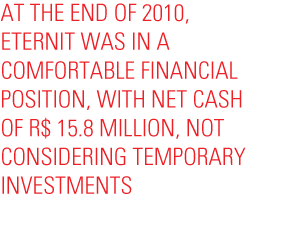03PLATFORM FOR THE NEXT 70 YEARS
OPERATIONAL AND FINANCIAL PERFORMANCE
The results described here should be read in conjunction with the audited financial statements and the respective explanatory notes. In 2010, it became obligatory for listed companies to publish their accounts in accordance with International Financial Reporting Stardards (IFRS). Eternit adopted the IFRS standard for the first time in 2007, and affirms that in 2010 there were no significant impacts resulting from the adoption of this standard, on either its results or shareholders’ equity.
Gross revenue
Under its Structured Program for Expansion and Diversification, Eternit established a target of doubling its sales from R$ 500 million to R$ 1 billion by the end of 2011. The Company has practically managed to meet this target a year ahead of schedule, having reported sales of R$ 991 million, up 33% on 2009. Since the implementation of the program, in 2007, gross sales had been expanding on a continuous basis. In 2010, as in 2009, the Company operated at full capacity in its chrysotile ore mining operations, and operated at a capacity utilisation rate of over 80% in its fibre cement manufacturing plants, taking into account the increased production capacity which came on stream at the end of 2010.
Tégula contributed to this performance with sales of R$ 88.3 million.
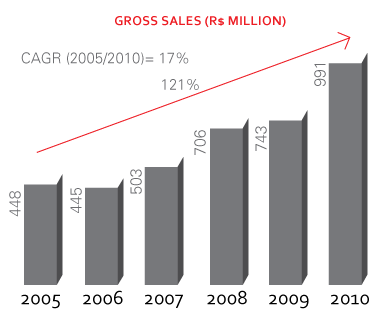

Net revenue
Eternit achieved a new record in net sales in 2010, jumping from R$ 583 million in 2009, to R$ 759 million in 2010. This result reflects the increase in sales volume, as well as the incorporation of Tégula's net sales, calculated at R$ 68 million.
Other factors that contributed to this result were:
- Fibre cement sales of 827,000 tons, an increase of 13% compared to 2009;
- Sales of 100% of chrysotile ore produced, totalling 306,000 tons;
- A price increase in fibre cement products of approximately 10%; and
- An increase in the price of chrysotile ore, of around 10% in the domestic market and 8% in US dollar terms in the export market.
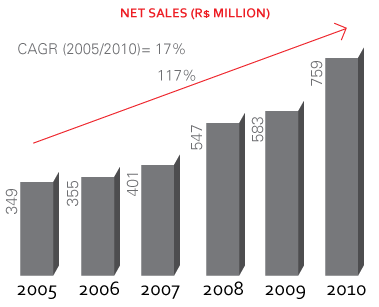

Operational costs and expenses
The Company's cost of goods sold (COGS) increased by 28% in 2010, jumping from R$ 337.6 million in 2009, to R$ 432.2 million. Gross margin widened by 1 p.p., YoY, amounting to 43%.
This increase in costs was due to higher sales volumes; the rise in the cost of raw materials; inflationary pressure; the inauguration of another fibre cement line, at the unit at Simões Filho/BA, in October 2010; the incorporation of the costs of subsidiary Tégula and the realisation of a premium, mostly referring to stock value, as a consequence of the reverse takeover between the subsidiaries of Eternit, Neptune and Monier Tégula.
The cost structure - both for the fibre cement as well as the chrysotile ore businesses - remained at the same levels as previous years, as shown in the charts below.
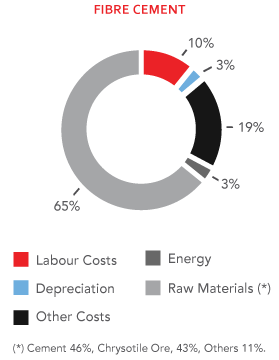

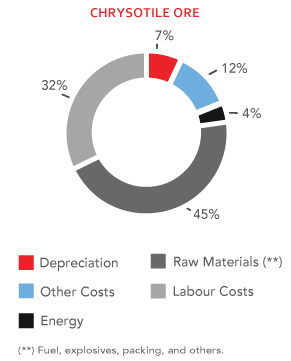



Operating expenses amounted to R$ 202.9 million in 2010, 44.8% higher than in 2009. The operational expenses of Tégula, incorporated from February 11, added R$ 17.4 million to this figure. The increase in administrative expenses was due to efforts expended on defending the use of chrysotile ore, increasing the size of the workforce to keep pace with the Company's growth, a provision for an incentive plan for the acquisition of shares by the Executive Board, and a provision for an additional bonus for all employees as a result of meeting the R$ 1 billion gross sales target ahead of schedule. With respect to the growth in sales expenses, this was the result of higher sales volumes; marketing initiatives for the promotion of new products and Eternit's participation in the Construindo um sonho program, part of the Domingo Legal program on the TV channel SBT; as well as the incorporation of Tégula's expenses.
EBIT and EBITDA
Eternit's EBIT (earnings before interest and taxes) amounted to R$ 123.7 million in 2010, up 17% compared to 2009 as a result of the operational aspects commented on previously.
EBITDA also increased, rising by 16% compared to 2009, to R$ 144.4 million. EBITDA margin, in turn, ended 2010 at 19%, down 2 p.p. compared to the previous year.
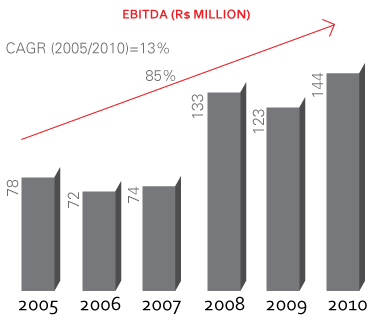

| RECONCILIATION OF EBITDA (R$ '000) | 2010 | 2009 | VARIATION 2009/2010 | |||
| Operating profit | 133,384 | 104,635 | 27% | |||
| Net financial results | -9,724 | 872 | - | |||
| Financial expenses | 22,676 | 19,236 | 18% | |||
| Financial revenues | -32,400 | -18,364 | 76% | |||
| Depreciation and amortisation of intangible fixed assets | 18,154 | 17,991 | 1% | |||
| Realisation of premium – most valuable stock | 2,539 | - | - | |||
| EBITDA | 144,353 | 123,498 | 17% |


Stock of fibre cement tiles
Net earnings
Net earnings in 2010 amounted to a total of R$ 102.1 million, a jump of 39.6% compared to the previous year's figure of R$ 73.2 million. Net margin remained stable, ending the year at 13%.
It should be noted that in 2010, net earnings were impacted positively by the booking of deferred income tax at subsidiary Tégula, of R$ 10.3 million.
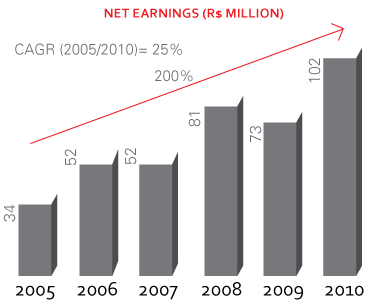

Investments
Eternit was practically the only company in its segment to carry out investment over the last two years in expanding production capacity. In 2010 alone, the Company invested R$ 92.8 million, allocated primarily to the acquisition of Tégula, expanding production capacity, the purchase of moulds, investment in new businesses and maintaining its industrial park.
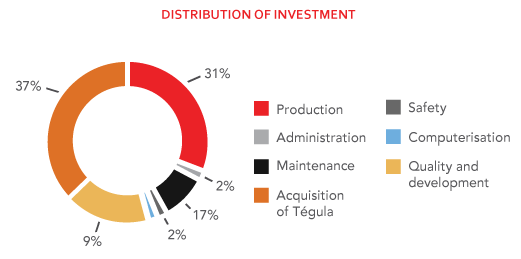


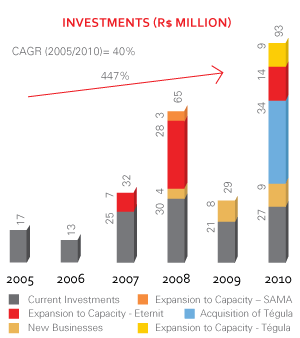
Consolidated cash flow
Eternit is a strong cash generator, but as a result of investments carried out, ended 2010 with a balance of cash generated of R$ 39.8 million, a reduction of 50.6% compared to the figure of R$ 80.5 million in 2009. In addition to cash generated, Eternit has a further R$ 40.9 million referring to the capital increase carried out at the end of 2009, available for the carrying out of new investment.
| ANALYSIS OF CONSOLIDATED CASH FLOW | 2010 | 2009 | VARIATION 2009/2010 | |||
| Initial balance | 80,472 | 31,278 | 157% | |||
| Operational cash flow | 100,103 | 97,454 | 3% | |||
| Total net investment | -61,974 | -92,412 | -33% | |||
| Net financial flows | -78,850 | 44,152 | 278% | |||
| Reduction in cash during the period | -40,721 | 49,194 | 183% | |||
| End balance | 39,751 | 80,472 | 50.6% |
Indebtedness
At the end of 2010, Eternit was in a comfortable financial position, with net cash of R$ 15.8 million, a gross debt evaluated at R$ 23.9 million, referring to advances on export contracts, and financial investments, cash and equivalents, of R$ 39.8 million. The Company's low level of debt is due to its practice of carrying out investments from its own resources.
For the purposes of this calculation, application in temporary investments was not included, this consisting of the funds raised from the capital increase at the end of 2009. As at the end of December 2010, the balance was R$ 40.9 million.
The Company does not carry out any leveraged derivative operations of any type in what could be interpreted as speculative positions.
| INDEBTEDNESS | 2010 | 2009 | VARIATION 2009/2010 | |||
| Total debt | -23,934 | -31,700 | 32% | |||
| Cash | 39,751 | 80,472 | 102% | |||
| Net debt | 15,817 | 48,772 | 208% |

